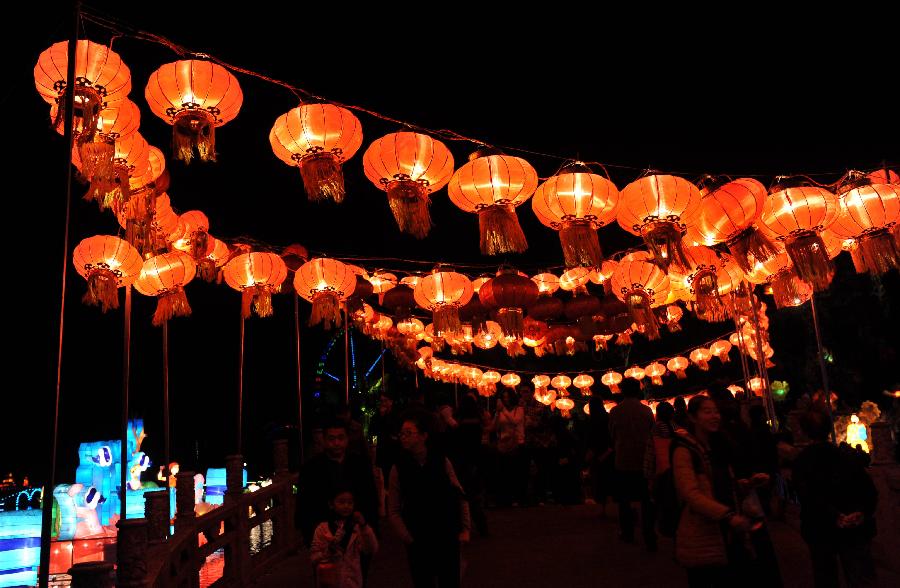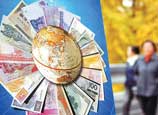
DUBAI, Feb. 24 (Xinhua) -- With the rise in bilateral trade between China and the oil-rich Gulf states, the demand for finance and business know-how are increasing and companies from both sides are jumping on this bandwagon.
"Goods against oil" has been for a long time the formula in trade relations between China and the Gulf Arab region, but this equation gets more and more outdated. Recent events indicate that the Sino-Arabian bound goes beyond tangible goods and enters the world of banking, finance and business consultancy.
The growing financial ties are most visible in the business development of China's biggest bank, Industrial and Commercial Bank of China (ICBC), which said Saturday that its Dubai-based Middle Eastern branch in 2012 a pre-tax profit of 54 million U.S. dollars, up 69 percent year on year, while its total assets increased 29 percent to 4 billion U.S. dollars.
"2012 was another year of strong growth for us as we continued to benefit from our regional franchise and unique position as a bridge for trade and investment between the Middle East and China, " said Tian Zhiping, the regional CEO of ICBC Middle East.
Since it established its Middle Eastern headquarters in the Dubai International Financial Center (DIFC) in April 2008, ICBC has spread its operational wings to all six member states of the Gulf Cooperation Council (GCC), which are Saudi Arabia, Kuwait, Bahrain, Qatar, United Arab Emirates (UAE) and Oman. Last year, the Saudi Arabian Monetary Agency granted ICBC a license and at the same time the world's biggest lender applied for a UAE retail banking license in order to serve the 200,000 Chinese nationals living in the Gulf state.
Global consultancy McKinsey and Company predicts that bilateral trade between China and the Middle East will reach between 350 billion U.S. dollars and 500 billion U.S. dollars by 2020, with the Gulf Arab states, most of them major oil suppliers, accounting for the lion's share of the trade.
These projections have recently motivated Asia's largest law firm Dacheng Law Offices from Beijing to enter a partnership with one of Dubai's law firms Hussein Lootah and Associates. When he signed the cooperative agreement on Feb. 3, Xiao Jianquan, senior partner of Dacheng Law Offices said that Chinese firms expanding to the GCC mostly demand legal advice when investing in the oil and gas sector and when conducting direct investments into Gulf Arab companies.
Wealthy Arab investors, on the other hand, are eager to invest in the booming Chinese economy, "but they are not yet so familiar with China like they are with western stock markets," said Mohab Mufti, the chief executive of Asiya Investments. Asiya, based in Dubai's financial free zone DIFC, launched a number of private equity funds that invest in Chinese small and medium enterprises.
"China is a big country, and we consult people about where to put the money, in which Chinese province, in which industries, and so on," said Mufti.
Regarding cross-border trade, the Chinese RMB is increasingly accepted by Arab importers. According to Norman Chan, CEO of the Hong Kong Monetary Authority, exports and imports done in RMB by the UAE account for only 4 percent of the Gulf state's total foreign trade "but chances are high that this figure will rise to double-digit in the coming years."
Tian said ICBC has taken part in important syndications and witnessed growing volumes of RMB transactions. ICBC recently signed a memorandum of understanding with Qatar's sovereign wealth fund Qatar Holding in order to boost bilateral cooperation and investments between Qatar and China.
The UAE's biggest bank Emirates NBD jumped on Feb. 6 on the RMB- bandwagon by launching RMB-denominated accounts and deposits in order to support small and medium enterprises (SME) to conduct trade settlements. Commercial Bank of Dubai (CBD) recently launched Tianlong Chinese Banking, offering a range of retail products and services solely customized for Chinese nationals in the Gulf country. In order to reach out to potential clients, CBD sponsored the Festival of Spring in Dubai which marked the start of the Chinese Year of the Snake.
According to the Dubai Chamber of Commerce and Industry, there are 3,000 Chinese firms licensed in the UAE.
For Mark McFarland, chief investment strategist private banking at Emirates NBD, the Sino-Arabian financial journey is far from over. "We haven't seen significant investments by Chinese nationals into local GCC markets yet, but there is a huge potential."
McFarland, who worked for a couple of years as a banker in Hong Kong, said in the UAE, there are 200,000 Chinese expatriates, more than twice the number of British nationals. He noted that some wealthy Chinese people have already started investing in property in Dubai and Abu Dhabi, and "the longer they stay in the country, the more they will consider Arab capital market as alterative vehicles of investment."


















![]()
